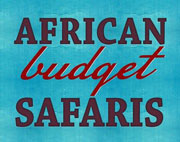African cultures and their sacred waters: How African folklore can help to preserve vital waterways
Folklore is a part of the oral history of a particular group or tribe that is passed down by word of mouth through stories and songs. It sparks the imagination of children, especially if told or sung at bedtime, and plays an important role in the maintenance of social norms and values in these groups. At times the folklore of an African culture relates to an aspect of the environment such as a wetland or river, or a species within it, which can play a vital role in how they are regarded and preserved.
African Wetlands
Africa has several coastal wetlands that are listed as World Heritage sites, including the Banc D'Arguin National Park in Mauritania, the Djoudj National Bird Sanctuary in Senegal, the Ichkeul National Park in Tunisia, the wetlands of the Lake Chad basin in Chad, areas of the Sudd in Sudan and the upper Niger basin in west Africa, and the Isimangaliso St Lucia wetland park in South Africa. Inland there is the Okavango Delta in Botswana, a UNESCO world heritage site, and the flooded forests in the Congo basin and Tanzania’s Malagarasi wetland, while Zambia and Uganda have extended areas of swampland.
One percent of Africa comprises wetlands, which are important for several reasons: they act as natural purifiers, mitigate storm damage (particularly important in this time of global warming), and reduce erosion. They also provide an incredibly rich, biodiverse habitat for a myriad of wildlife species, both plant and animal, which has massive tourism potential.
There is a growing global trend amongst scientists and conservationists to tap into the vast reservoirs of indigenous knowledge that has developed, and been passed down through generations as folklore and myth. African cultures are rich in oral history that informs the relationship between people and the natural world, and it is by exploring African mythology that we can begin to discover more sustainable ways to protect Africa’s wetlands.
 The okavango delta in botswana
The okavango delta in botswana
Water Spirits in African Mythology
Anthropologists and cultural historians have found that water spirit traditions were common across Africa before the European colonisation process began, and several survive to this day. Most of the water spirits are female due to the life-giving properties of water, and they often have a dual nature, as water not only provides a means to purify, transport people and goods, and grow crops — it can also drown entire villages during floods.
Mami Wata: Africa’s most popular water spirit
Mami Wata is the most popular African water spirit that is still worshipped across west, central and southern Africa. She is similar to the western mermaid, with a woman’s upper torso and the lower part of her body in the form of a fish or serpent; often a serpent is entwined about her. Those who travel on water or swim in it may be abducted by her, which is usually a positive experience, as those who return from her realm beneath the surface often become rich and attractive. She is also linked to healing and fidelity and is a guardian of nature. Mami Wata is an example of African mythology that has been exported around the world. She was exported with the African diaspora and was worshipped by slaves in the Caribbean and is still popular today, appearing in a host of films and books —trumpeter Hugh Masekela even has a song named after her.
Nyami Nyami: The Zambezi River God
Snakes are almost universally associated with water in African mythology. The enormous and fearful river god Nyami Nyami is believed to live beneath the waters of Lake Kariba, which, when completed, rose to cover the home of the god and separated him from his wife downstream, much to his annoyance. A series of floods occurred in the Zambezi valley in the 1950s that delayed the building of the dam and caused the loss of 80 construction workers’ lives, confirming for the Tonga people in the region that Nyami Nyami was displeased and had exacted his revenge. African folklore finds ways to live alongside the modern world and travellers to Victoria Falls and the Zambezi River in Zambia or Zimbabwe today, will often return with a carved effigy of this most powerful spirit.
__medium.jpg) Osun osogbo shrine sacred water (2) by Carsten Ten Brink
Osun osogbo shrine sacred water (2) by Carsten Ten Brink
Oshun: the Yoruba God of Love, Fertility, and Freshwater
Another example of African Mythology comes from Yorubaland in Nigeria. The Yoruba tribe of West Africa worship the goddess Oshun. Oshun is the female embodiment of love, fertility, and freshwater, and is credited with crafting humans with grace and beauty where other gods had failed. Oshun is a mediator between the physical and spiritual realms and guides humans towards balance and harmonious relationships.
Representing beauty and the rejuvenating properties of water, it is not surprising that Oshun’s role in these African folkloric traditions is intertwined with the guardianship of freshwater. The connection of Oshun to natural heritage, and the importance of water for sustenance and livelihood, is an example of how connecting to these African myths, can enhance conservation strategies.
 Osun osogbo shrine sacred water by Carsten Ten Brink
Osun osogbo shrine sacred water by Carsten Ten Brink
The largest surviving sacred grove in Yorubaland can be found in Osun-Osogbo, a city founded 400 years ago in southwest Nigeria. Situated 250 km / 155 miles from Lagos, this sacred grove, protects the last remnants of primary high forest in southern Nigeria and is dedicated to the river goddess Osun. Amidst the dense forest, 40 shrines, sculptures, and artworks honour Osun. These artworks and shrines give a modern, 20th–century twist, and serve to strengthen ties between the Yoruba, their cultural heritage, and the environment.
Functioning as an active religious site, the sacred grove at Osogbo hosts daily, weekly, and monthly worship, and annual festivals. Containing over 400 plant species – many with medicinal properties, the sacred grove serves as a natural pharmacy.
 Sacred waters in isimangaliso wetland park
Sacred waters in isimangaliso wetland park
African Mythology and Tales of Preservation
Lake Fundudzi in South Africa’s Limpopo province, — the only sizable natural freshwater lake in South Africa — is considered sacred by its custodians, the Vhatavhatsindi clan, part of the Venda tribe. They have more than 20 myths about the lake, including the belief that if you take water from Fundudzi, it will evaporate before you reach your destination; if you collect wood or artefacts from near the lake, you will get lost; and no items taken from the lake or the area around it may be sold — if you do so, you will disappear.
All of these taboos, communicated through folklore about the sacred waters, protect the lake and its surrounds.
In KwaZulu-Natal, South Africa, there’s a Zulu folktale about how the Queen Mother Indlovukazi once embarked on a trip with some warriors to reconnect with their environment. They walked for days, using animals as guides, but when they had to collect water, they could not find a spring that had frogs. Frogs indicated that the water source was suitable for the queen, and it took much effort to finally find one. Indlovukazi and the warriors decided to come up with a strategy to return frogs to the rivers. The great warrior Mpeku remembered how he threw stones at the frogs when he was a boy and threw rubbish in the rivers, which chased the frogs away, and it was decided to educate young boys about the importance of amphibians.
This African folklore story became a narrative that served to conserve the frogs and streams in KwaZulu-Natal today. The story is remarkable because the lead warrior, Mpeku, is rewarded with the responsibility of crafting folklore narratives that will aid in protecting Zulu natural heritage, intentionally associating positive experiences with particular species. In this African folklore, the warrior is turned from battle-warrior to eco-warrior.
 Victoria falls on the mighty zambezi
Victoria falls on the mighty zambezi
African Mythology and Africa's Sacred Waters
The impact of urbanization and development on traditional African cultures and ecosystems highlights the relevance of African folklore and mythology, which promote the stewardship of the environment and the preservation of sacred waters in Africa. Documenting such traditional beliefs may provide pathways towards more sustainable conservation strategies that are built on a relational rather than an extractive model of connecting people and nature.
Going forward, conservation efforts focused on Africa’s water systems should not be based on Western science alone; to be holistic, they should take into account the indigenous knowledge of the tribes living near them as well. It is also vital for conservationists to look at the whole ecological context, as all systems in nature are interdependent — something that African tribes have known for millennia.
If you liked this post, these trips cover similar ground…
- 9 Day Zambia Safari: Lower Zambezi & South Luangwa National Park
- 8 Day Zambia Walking Safari in South Luangwa Valley
- 16 Day Zambia & Malawi Safari (Small Group Tour)
- 12 Day Botswana Safari: Wildlife & Okavango Delta Lodge Tour
- 13 Day Botswana Camping Safari - Kalahari & Okavango Delta
- 9 Day Botswana Lodge Safari: Chobe, Okavango Delta & Deception Valley
- 7 Day Chobe, Okavango Delta & Moremi Lodge Tour




 Derek lives in Joburg, so any trips into the bush or along the coast border on being spiritual experiences. He is an author, editor, poet and a musician who enjoys cutting to the chase and discovering what lurks beneath the surface. Southern Africa has an endless wealth of hikes, trails and sights that keep him inspired.
Derek lives in Joburg, so any trips into the bush or along the coast border on being spiritual experiences. He is an author, editor, poet and a musician who enjoys cutting to the chase and discovering what lurks beneath the surface. Southern Africa has an endless wealth of hikes, trails and sights that keep him inspired.












